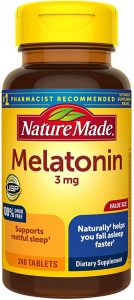Is Melatonin a Safe Sleep Aid for Kids and Adults?
There is a scarcity of safety data for melatonin, but there are a few potential issues, particularly for children.

“I think we simply don’t have the foggiest idea what the potential long-term impacts are, especially when you talk about children,” said Dr. Judith Owens, director of Boston Children’s Hospital’s Center for Pediatric Sleep Disorders. “The guardians really must understand that the harmful effects are expected.”
The pineal gland in the brain increases melatonin production in the evening, as the light fades, to promote sleep, and decreases production in the early morning hours. Because melatonin is found in some foods, such as olives, walnuts & barley, it is regulated as a nutritional supplement rather than a drug, as most other hormones are.
Melatonin has been shown in studies to be effective for sleep deprivation and some sleep disorders in adults. It is also widely used as a sleep aid for children and can help with sleep disorders in people with attention deficit disorder or autism, according to Dr. Owens. “I have hardly seen any family who has tried Melatonin for their kids,” she said. “I will say at least 75% of the time when they come in to see us at the sleep clinic, they are either on melatonin or have attempted it in the past.”
While momentary utilization of the hormone is generally considered safe, it can lead to headaches, drowsiness, and daytime grogginess, which could endanger drivers. Melatonin can also disrupt blood pressure, blood-thinning & diabetes, and medications.
We know little about the powerful effects of this hormone in children. Some studies suggest that at least in theory it may have effects on the development of the reproductive, immune, cardiovascular, and metabolic systems.

